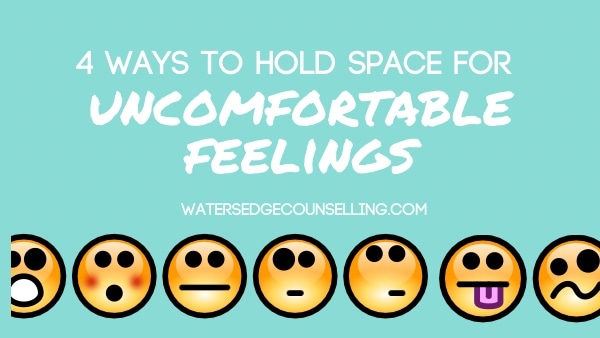
Some feelings are just uncomfortable. Sadness, uncertainty, grief, frustration – we often try to avoid them by numbing or processing them once like an equation, and assume they are done.
But feelings don’t work like that. They aren’t linear – and even the things we have processed can pop back up thanks to a trigger, an intense situation or the fact you are human! If we push them down, they will always come out, whether it’s like an angry explosive volcano or a black hole caving in on on itself.
So how can we hold space for uncomfortable feelings – not getting lost in them, but honouring what they are telling you and trusting they will pass (because they always do)? Here are four practical ways you can hold space for difficult emotions:
- Set a time limit
Sure, emotions don’t have a time limit and they won’t disappear when your alarm goes off. But if you struggle to even sit with an uncomfortable feeling, start small. Set a timer, one minute, then two, then five, and practice deep breaths as you sit with the emotion. You don’t have to fix it, or even understand it. Just feel it in your body knowing it is there for a reason. You could even use a sensory toy as you do this.
- Journal
A tried and true favourite. Journalling is a great way to get out your emotions and expel them from your body. If you’re not sure what or why you are feeling a certain way. That’s ok! Just start writing about your day, or dot point three good things that happened, three not so good things, and three feeling words, or a picture, that capture how you feel in the moment.
- Do cardio exercise
Frustration and anxiety can build up in our bodies, leading us to muscle spasms, headaches and migraines, aches and pains. Your feelings are trying to find their way out, so do it on your own terms. Choose a cardio activity and get all the emotions out. Running, dancing, rowing, boxing – find something that makes you sweat, and gives you permission to push the feelings through your body.
- Watch a film or listen to a song that helps you to connect with the same feelings expressed
This is different from numbing yourself with a mindless movie or Tik Tok reel that distracts you from feeling. If you are feeling sad, grief stricken or heart broken but feel unsafe or uncomfortable sitting with this, choose a movie or music that captures this feeling and experience the emotions through the art.
If you need to cry, choose a film that will make you cry. In the end, it doesn’t matter if you’re crying about what has happened in your life or what has happened in the film, your body is able to express that emotion and you will feel better afterwards. If not, turn the film off or swap it out for something hopeful. We want to feel our emotions, not become lost in them. And if you aren’t sure how to do this, ask a friend to view the movie with you.
Do you want to process your emotions in a safe space? Contact Colleen on 0434 337 245, Duncan on 0434 331 243 or Rachel on 0442177193 for a FREE 10-minute phone consultation on how we can best help you, or press book now and make an appointment.